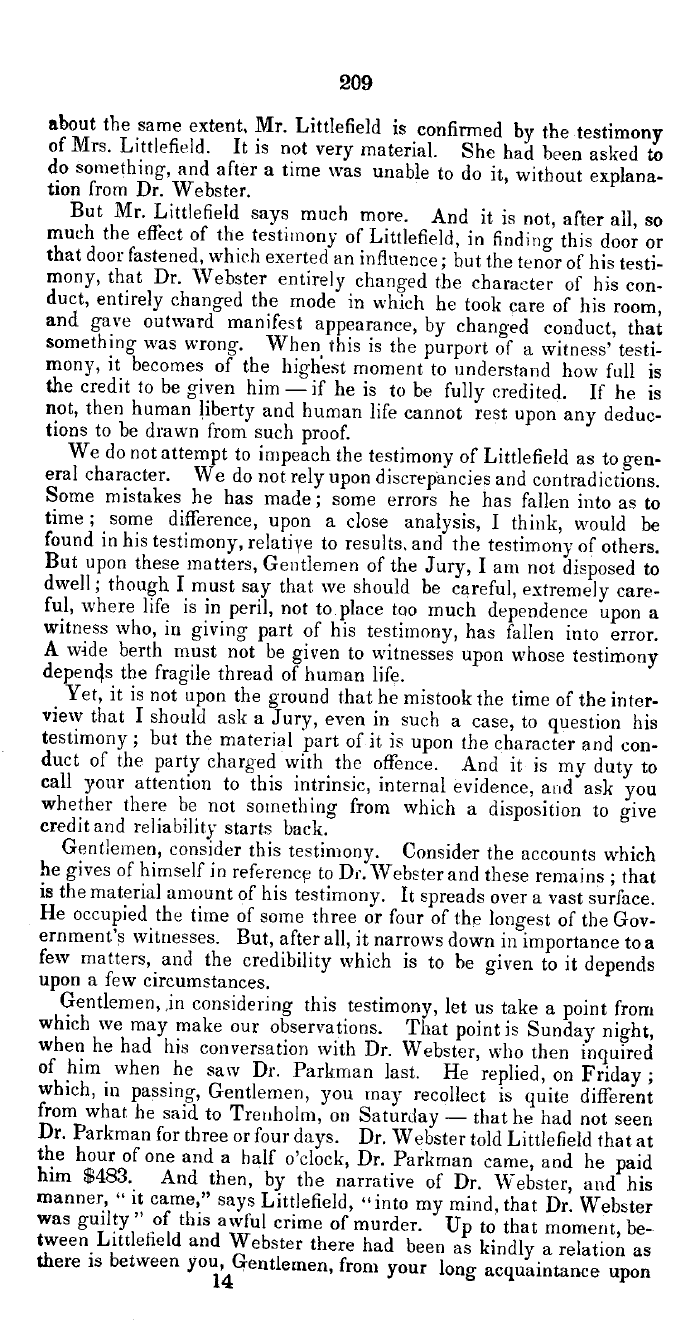|
209
about the same extent, Mr. Littlefield is confirmed by the testimony
of Mrs. Littlefield. It is not very material. She had been asked to
do something, and after a time was unable to do it, without explana-
tion from Dr. Webster.
But Mr. Littlefield says much more. And it is not, after all, so
much the effect of the testimony of Littlefield, in finding this door or
that door fastened, which exerted an influence; but the tenor of his testi-
mony, that Dr. Webster entirely changed the character of his con-
duct, entirely changed the mode in which he took care of his room,
and gave outward manifest appearance, by changed conduct, that
something was wrong. When this is the purport of a witness' testi-
mony, it becomes of the highest moment to understand how full is
the credit to be given him-if he is to be fully credited. If he is
not, then human liberty and human life cannot rest upon any deduc-
tions to be drawn from such proof.
We do not attempt to impeach the testimony of Littlefield as to gen-
eral character. We do not rely upon discrepancies and contradictions.
Some mistakes he has made; some errors he has fallen into as to
time ; some difference, upon a close analysis, I think, would be
found in his testimony, relative to results, and the testimony of others.
But upon these matters, Gentlemen of the Jury, I am not disposed to
dwell; though I must say that, we should be careful, extremely care-
ful, where life is in peril, not to.place too much dependence upon a
witness who, in giving part of his testimony, has fallen into error.
A wide berth must not be given to witnesses upon whose testimony
depends the fragile thread of human life.
Yet, it is not upon the ground that he mistook the time of the inter-
view that I should ask a Jury, even in such a case, to question his
testimony; but the material part of it is upon the character and con-
duct of the party charged with the offence. And it is my duty to
call your attention to this intrinsic, internal evidence, and Vask you
whether there be not something from which a disposition to give
creditand reliability starts back.
Gentlemen, consider this testimony. Consider the accounts which
he gives of himself in reference to Dr.Websterand these remains ; that
is the material amount of his testimony. It spreads over a vast surface.
He occupied the time of some three or four of the longest of the Gov-
ernment's witnesses. But, after all, it narrows down in importance to a
few matters, and the credibility which is to be given to it depends
upon a few circumstances.
Gentlemen,,in considering this testimony, let us take a point from
which we may make our observations. That point is Sunday night,
when he had his conversation with Dr. Webster, who then inquired
of him when he saw Dr. Parkman last. He replied, on Friday ;
which, in passing, Gentlemen, you may recollect is quite different
from what. he said to Trenholm, on Saturday - that he had not seen
Dr. Parkman for three or four days. Dr. W ebster told Littlefield that at
the hour of one and a half o'clock, Dr. Parkman came, and he paid
him $483. And then, by the narrative of Dr. Webster, and his
manner 1° it came," says Littlefield, " into my mind, that Dr. Webster
was guilty " of this awful crime of murder. Up to that moment, be-
tween Littlefield and Webster there had been as kindly a relation as
there is between you, Gentlemen, from your long acquaintance upon
14
|

